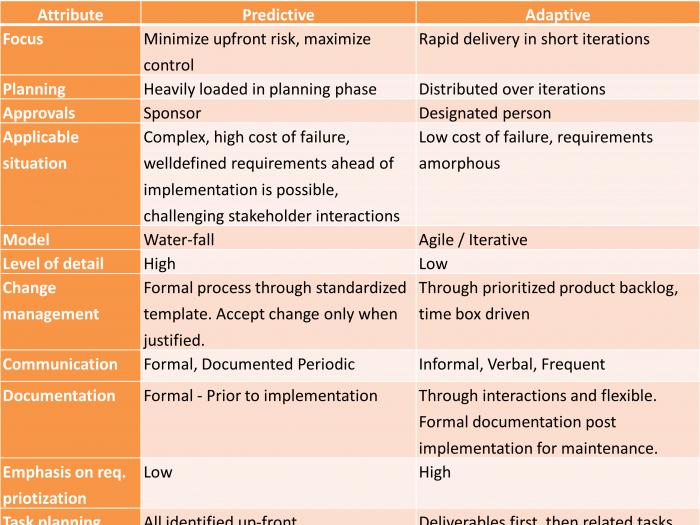Choosing Business Analysis Approach Without Losing Your Hair
Business analysis approach in the key decisions that any business analyst has to take during any change initiative. The business analysis body of knowledge provides two distinct approaches for business analysis - Predictive and adaptive. On what basis should we choose these two approaches? Which one works better and when?
So let's take few parameters and find which approach will work better under what circumstances.
Before we make up our mind sharing the chart that will show us the key difference between predictive and adaptive approaches.

As you can clearly see, the predictive approach assumes that your requirements are stable and hence they can be planned reasonably accurately upfront. How likely is the project requirements are likely to be stable? If we look at engineering, or construction activities, their requirements can be fairly stable, and hence productive approach works very well.
However in the commercial world or in a world where things are changing very fast, assuming requirements to be stable for a longer duration is extremely hard. I sincerely doubt anybody can predict confidently how things will happen in the era of artificial intelligence, or big data, or blockchain. Such things are really unpredictable and planning something for a horizon of more than 2 to 3 years would actually be counterproductive.
Similarly, when we are building a product for consumers, it's hard to predict what customers may like. Customer preferences are also can change quite rapidly.
In such situations, it makes immense sense to go for adaptive approaches because adaptive approaches can adapt to changes better.
So one factor of course we identified is the stability of the requirements.
Are there other factors that we can affect the business analysis approach selection?
From a risk mitigation perspective, Agile has the better risk mitigation ability because we are not doing the entire project in one go. So if something goes wrong, we have the ability to correct our path and then move forward.
Another factor we should consider is the legality aspect with respect to contractor scope. If one is bound by legal or contractual norms, it may work better for the supplier to work in a predictive manner because that protects you from additional changes that you may see during the progress of the project.
But if the Client or the organization that the business analyst is working with are open to working in a more collaborative way and open to having more tolerance towards failure Agile would work quite well.
These are few factors that I considered important when choosing a business analysis approach.
I would like other business analysts to share their inputs for benefit of the entire business analyst community.
You May Also Like
These Related Stories

How to Launch Your BA Career in 2025

ECBA Exam Pattern for 2025 | Free 50 ECBA Mock Questions



No Comments Yet
Let us know what you think